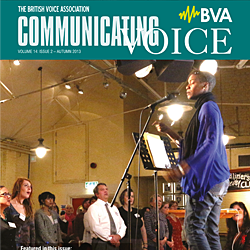About the Association
Archived newsletter articles
Singers’ Hearing
By Peter Harrison, August 2000
The subject of Janice Chapman's Feature Article (Newsletter Vol. 1.1) was well chosen. In singing, our ears are of primary importance. "We sing with our ears", says Alfred Tomatis; "First hear, then know", counselled Frederick Husler.
Teachers and singers must however make a clear distinction between three fundamentally different aspects of hearing. First, that which enables us to distinguish musical sounds and qualities externally. This is the province of our modern, thinking brain. Second, that which enables us to imagine sounds. Singers, like all musicians, must highly develop these abilities. The third aspect is that which enables us to hear and monitor our own voice internally as we sing. This comes from our primitive brain.
Without a clear distinction, confusion reigns. Mixing musical and vocal objects can be damning. They must be treated separately if they are to happily complement each other. Hearing in this third way is the only means of achieving and maintaining precision and economy (healthy) in an instrument which can otherwise prove unwieldy and indistinct (unhealthy). Sadly, this inner hearing has been widely neglected in teaching practice and given short shrift by voice researchers over the past century. The eye has largely taken over and, with it, 'observable' (and feelable) physical manifestations and sensations. I believe the voice will never be adequately understood until this aspect is fully explored.
Yes, the so-called bel canto school understood the need to regain subjective aural knowledge and control, enabling them to sing senza muscoli. Singers need appropriate feedback from aurally literate (albeit empirical) teaching.
I think that recording machines are too removed from the Subject's moment of sound and tend to promote dependence on external reception. The aurally perceptive teacher can indicate, in the moment, that the sound the singer is making (and hearing) is correct, on the right track, "honest", as Janice so aptly puts it.
The individual's perceived self-image in sound is always a complicating issue that must be appropriately and sensitively addressed. In regaining the true sound of his/her voice, the singer can regain self-confidence and self-empowerment. This is necessarily a process of supervised regeneration. It can take many years. I know of no short cut.
Because of this, for some years in London I have given daily lessons to as many pupils as could manage them (no practice in between!). This has required great dedication, but no more than would be expected of any aspiring dancer or athlete. Progress has been much faster and, forgive the pun, sounder for the continuity. I shall be operating this scheme in my new position as Singing Teacher of the new Opera Studio in Oporto.
More archived content online
Disclaimer
Neither the British Voice Association nor the Editor can be held responsible for errors or any consequences arising from the use of information contained in its newsletters (or extracts from its newsletters published online); the views and opinions expressed do not necessarily reflect those of the British Voice Association (BVA) or the Editor, neither does the publication of advertisements constitute any endorsement by the BVA or Editor of any products or services featured.

 Join us Now!
Join us Now! our newsletter
our newsletter free voice care leaflets & information – download here
free voice care leaflets & information – download here Help our work by donating while you shop
Help our work by donating while you shop